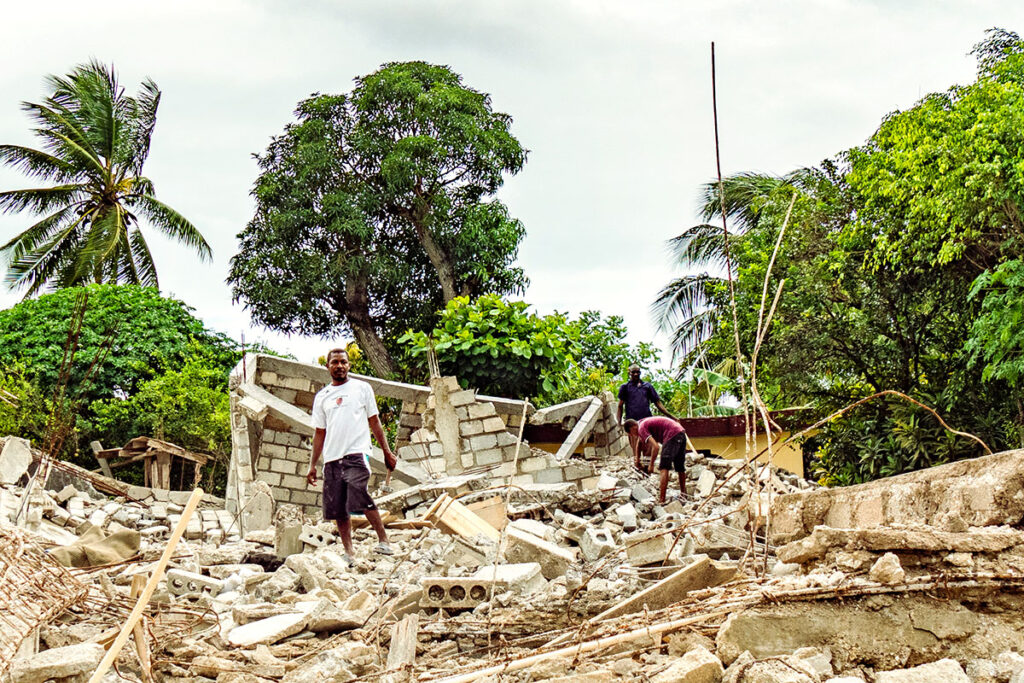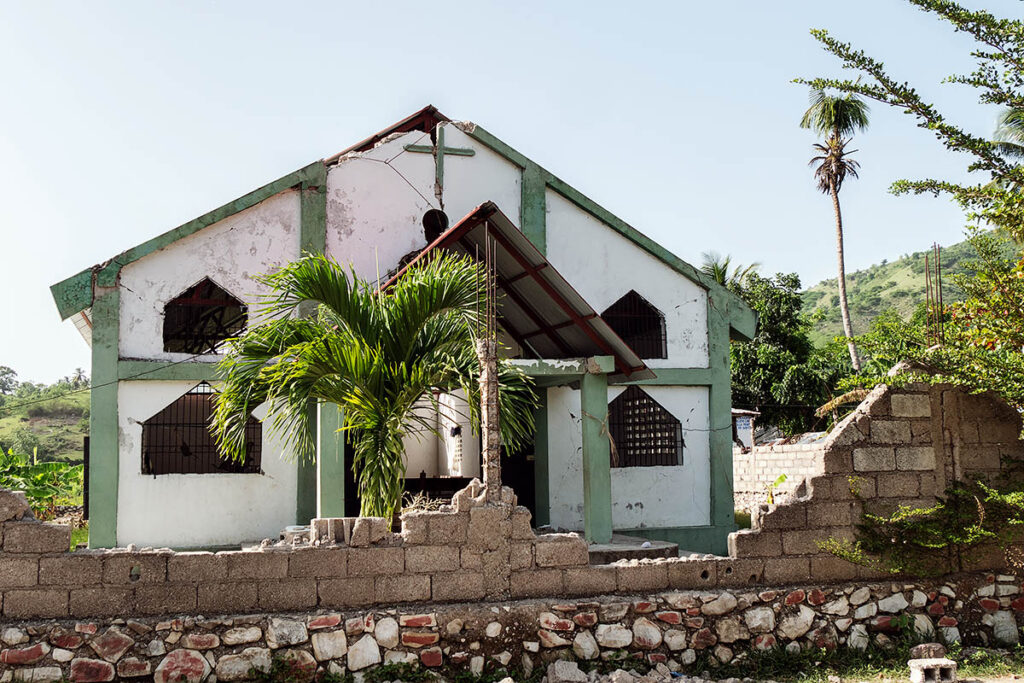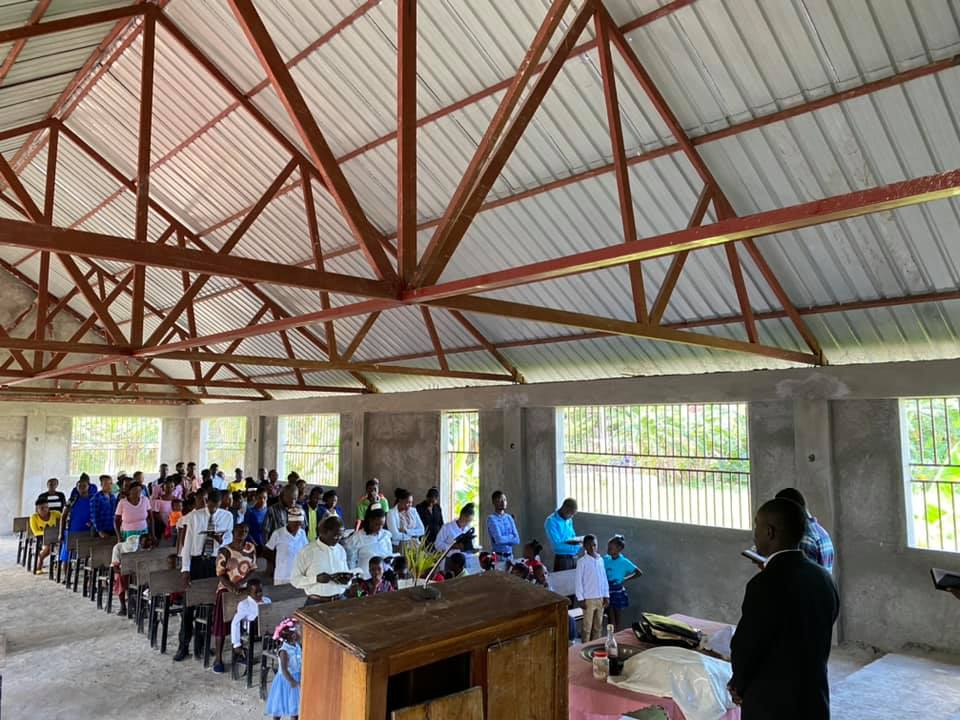Mercy
Hope Amid the Rubble
After an earthquake, and amid political chaos in Haiti, LCMS Disaster Response is working with local Lutheran ministries to offer hope and help.
When natural disasters strike even the most affluent and accessible areas, the devastation can require months or years of recovery work.
When natural disasters strike a country like Haiti — the poorest country in the Western hemisphere, densely populated by over 11 million residents, beset by political turmoil and a lack of social infrastructure such as passable roads, water systems, medical services and employment opportunities — recovery can seem beyond hope.
And disasters do strike Haiti. Sitting at the intersection of two tectonic plates, and accessible to both the Atlantic Ocean and the Caribbean Sea, Haiti is a target for frequent earthquakes and hurricanes. For those already living in abject poverty, fear of these disasters and the ruin they bring is always looming.
The morning of Aug. 14, the southwestern tip of Haiti sustained a 7.2 magnitude earthquake, which killed over 2,200 people and destroyed countless homes, buildings and critical infrastructure. It was stronger in magnitude than the disastrous earthquake that struck Port-au-Prince in 2010. Fortunately, as it hit a less densely populated part of the country, the death toll was many times lower than in 2010. And yet, for those in the affected area, the loss was utterly devastating.
To make matters worse, the current political instability in Haiti, where the president was assassinated in July and gangs control major areas of the country including many roads and ports, makes accessing the resources needed to begin rebuilding, as well as critical necessities such as food and clean water, nearly impossible.
Houses still sit in rubble where they fell. Families crowd together in homes meant for half the number of occupants. Many struggle daily to find sufficient food and clean water.
Providing care and relief in such a dire and complex situation requires exact knowledge of the circumstances and conditions on the ground, as well as relationships with people in the country. By God’s grace, LCMS Disaster Response has several partners that work year-round in Haiti and have the knowledge and networks needed to make an impact.
Through partners on the ground, including LCMS Recognized Service Organization Ministry In Mission and the nonprofit Trinity HOPE, LCMS Disaster Response is working in Haiti to rebuild, provide food and resources, and remind the suffering of the hope they have in Christ.

Top of page: The Rev. Dr. Ross Johnson (right), director of LCMS Disaster Response, visits with a retired pastor of the First Evangelical Lutheran Church of Les Cayes, Haiti, one of the first Lutheran church plants in south Haiti.
‘A Reminder That God Has Not Abandoned Them’
Sea containers of relief supplies sit in ports that are inaccessible due to high gang activity. Major roads between cities and villages are guarded by gangs, making them impassible. Gasoline, when it can be found at all, is prohibitively expensive.
“The earthquake was one thing, but [the gang control] is almost a worse disaster, because it encompasses the whole country,” said Jackie Rychel, founder and president of Ministry In Mission.
Nonetheless, with over a decade of experience responding to natural disasters in Haiti, and with strong relationships with the pastors and congregations of the Evangelical Lutheran Church of Haiti (ELCH, a partner church of the LCMS), Ministry In Mission is working steadily to provide aid in spite of the difficulties.
Assisted by grants from LCMS Disaster Response, they are nearing completion of the rebuilding of three ELCH church buildings in the towns of Plaine Martin, Carrefoure Dulcos and Maniche. Each of these churches was either destroyed in the earthquake or had to be taken down to its foundation due to significant structural damage. Through Water for Life Haiti, a new well has also been installed on the grounds of an ELCH church, providing clean and safe water to the surrounding community.
Destruction provides an opportunity to build back with a clearer vision and purpose. And the local ELCH pastors who have helped with the reconstruction of these churches over the past decade have taken this opportunity quite literally. Since the earthquake in 2010, the churches that have been rebuilt following disasters have all been built in the same architectural style and with similar paint colors, to set them apart as churches of the ELCH.
“When you pull into that village, you recognize it as a Lutheran church,” said Rychel. These church buildings, built to the highest Haitian architectural standards, serve as “arks” of shelter in more than a symbolic way. They are built to withstand hurricanes and will serve as places of refuge for locals when storms threaten their homes.
“It’s a reminder that God has not abandoned them,” said the Rev. Dr. Ross Johnson, director of LCMS Disaster Response. “They can see that the Lord is working through His church. … Rebuilding churches and homes is a way that the church remains a light to the darkness and brokenness of the sinful world, especially in Haiti, where there is not a lot of hope.”
This reminder is working, said Rychel. “After the 2010 earthquake, they came flocking by the thousands into the Lutheran churches. After the hurricane and building all these new churches, even more started coming. So, the Lutheran religion in Haiti is growing very rapidly.”
‘Silent Partners’
Long-term work like construction is not the only thing needed in the wake of the earthquake’s devastation. Day-to-day necessities like food and water, already in short supply for many Haitians, remain a desperate need in the communities affected by the earthquake.
Trinity HOPE is an organization founded and run by LCMS Lutherans that provides daily meals to children in Christian schools in Haiti. In response to the earthquake, the organization has used its network of food vendors and distributors to help LCMS Disaster Response provide hundreds of thousands of meals to Haitian families in need.
Through a grant from Disaster Response of $100,000, distributed in two phases, Trinity HOPE is working through nine distribution points (five in Les Cayes and six in Jeremie), most of which are Lutheran churches, to hand out meal kits of beans, rice and oil to families. Each kit contains around 15.5 lbs. of rice, 4.5 lbs. of beans and 1 quart of oil — enough to provide close to 50 meals.
Over 170,000 meals have been distributed already, and a second phase is underway that will distribute around the same number again.
As with the rebuilding projects, this effort is being carried out under a triangular model: LCMS Disaster Response provides funding to a ministry with the local infrastructure to provide efficient and effective aid, and that local ministry works in partnership with local Lutheran pastors and churches to carry out mercy work. Trinity HOPE provided an ELCH pastor in each of the nine regions with a certain number of tickets, which he distributed to those in his region based on their level of need. A ticket could be redeemed for a meal kit at one of the distribution points, most of which were ELCH churches.
“By using existing infrastructure and relationships that are there, it really does make the efficiency significantly higher. … The local pastors and the local communities, they’re the ones that know where the need is the greatest,” said Keith Logan, executive director of Trinity HOPE.
This model also serves as a great opportunity for witness, connecting the local Haitians directly with local Lutheran churches and pastors.
“It shows the community at large that Lutherans care,” said Johnson. “And so, it really builds up the Lutheran pastor and the Lutheran church and makes them the heroes in this situation. The people in Haiti, they don’t really know about Trinity HOPE or LCMS Disaster Response, we’re kind of silent partners in that aspect. And that’s absolutely fine, because we really want the heroes of the story to be the local congregation that we’re partnering with.”
There for the Long Haul
After the 2010 earthquake, Rychel watched relief organizations pull out one by one as their projects wrapped up. She had heard a statistic that “long-term” mission workers sent to Haiti lasted an average of only three to five years, and she began to see that statistic borne out.
Rychel decided she wasn’t going anywhere.
“I started thinking, what’s going to happen when they pull out? There’s so much need here anyway, forget the fact that there’s a disaster! People are starving to death, literally, in general,” she said.
Both Ministry In Mission and Trinity HOPE work year-round, every year, providing relief and hope to Haitians.
Ministry In Mission focuses on day-to-day relief programs, such as funding the education of 500 Haitian children; operating a twice-a-week feeding program for children; providing support for Lutheran churches and their pastors; and constructing, among other things, an orphanage and an elder care home.
Trinity HOPE works through 240 Christian schools throughout Haiti, providing 52,000 meals to children each day, or nearly 10 million meals every school year.
Once the disaster response projects wrap up, organizations like Ministry In Mission and Trinity HOPE will stay on the ground, working to alleviate suffering and bring the light and hope of Christ to Haitians. They will cultivate relationships and build trust. They will work to strengthen the network of churches of the ELCH and support its pastors and people. And when disaster strikes again, they will be ready to partner with LCMS Disaster Response in bringing immediate and thoroughly effectual aid to those affected.
Learn More
• About LCMS Disaster Response
• About the Synod’s response to the earthquake
Stacey Eising
Managing editor for The Lutheran Witness.



